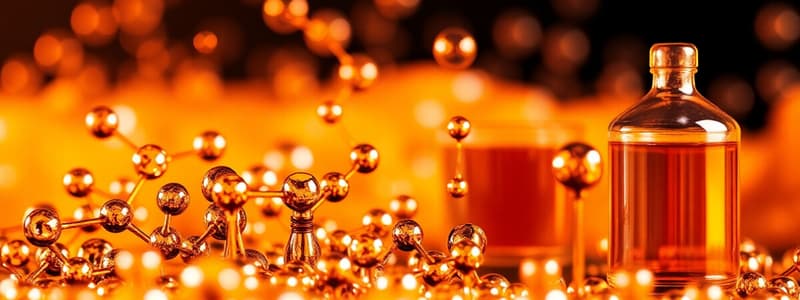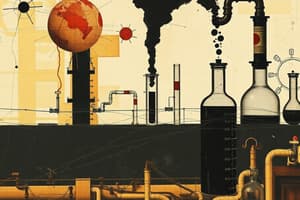Podcast
Questions and Answers
What defines crude oil and what is its primary composition?
What defines crude oil and what is its primary composition?
Crude oil is defined as a finite resource found in rocks, and it primarily consists of the remains of ancient biomass, mainly plankton.
What is the general formula for hydrocarbons, and name the first four alkanes?
What is the general formula for hydrocarbons, and name the first four alkanes?
The general formula for hydrocarbons is $C_nH_{2n+2}$, and the first four alkanes are methane, ethane, propane, and butane.
Describe the process of fractional distillation in separating hydrocarbons from crude oil.
Describe the process of fractional distillation in separating hydrocarbons from crude oil.
In fractional distillation, crude oil is heated in a fractionating column, causing it to evaporate and then condense at various temperatures, allowing separation into fractions.
How are the fractions collected during fractional distillation based on their properties?
How are the fractions collected during fractional distillation based on their properties?
What role does the petrochemical industry play in the utilization of fractions obtained from crude oil?
What role does the petrochemical industry play in the utilization of fractions obtained from crude oil?
Flashcards
Crude oil
Crude oil
A mixture of many different hydrocarbons, formed from the remains of ancient organisms like plankton, buried over millions of years.
Hydrocarbons
Hydrocarbons
Compounds made up of only carbon and hydrogen atoms.
Alkanes
Alkanes
A series of hydrocarbons with the general formula CnH2n+2, where 'n' represents the number of carbon atoms.
Fractional distillation
Fractional distillation
Signup and view all the flashcards
Petrochemical industry
Petrochemical industry
Signup and view all the flashcards
Study Notes
Crude Oil, Hydrocarbons, and Alkanes
- Crude oil is a finite resource found in rocks,
- It is the remnants of ancient biomass, mostly plankton, buried in mud.
- It is a mixture of many compounds where the chemical properties of each substance are unchanged.
- It's possible to separate components through physical methods like distillation.
- Most crude oil compounds are hydrocarbons (composed solely of hydrogen and carbon).
- Many of these are alkanes.
Hydrocarbons
- General formula: CnH2n+2
- Alkane molecules can be represented in various structural forms.
Fractional Distillation and Petrochemicals
- Crude oil is heated in a fractionating column.
- Different components evaporate at varying temperatures and condense at specific levels.
- The column efficiently separates hydrocarbon fractions.
- Each fraction has molecules with similar carbon numbers.
- Heated oil enters the bottom of the column; vaporized oil rises through.
- Fractions are constantly collected at their condensation points at varied levels.
- Fractions can be processed into fuels and petrochemical feedstock.
Studying That Suits You
Use AI to generate personalized quizzes and flashcards to suit your learning preferences.




